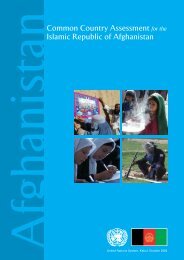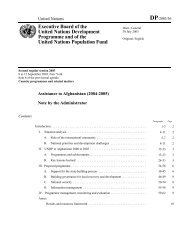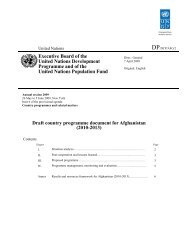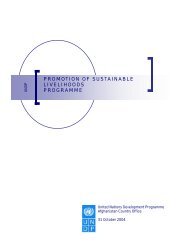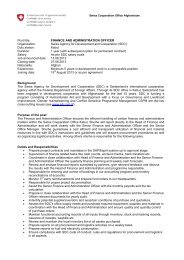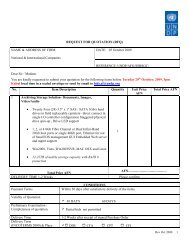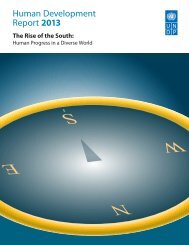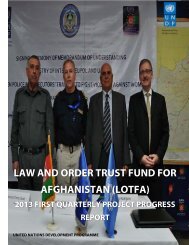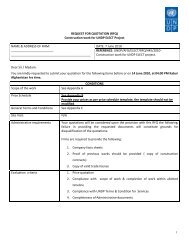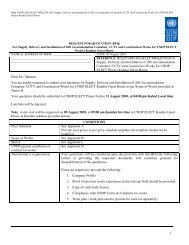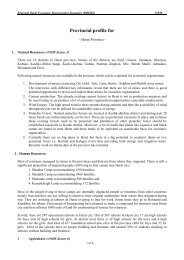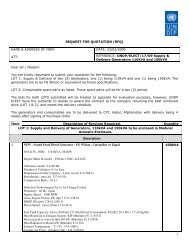Development Cooperation Report 2012 - UNDP Afghanistan
Development Cooperation Report 2012 - UNDP Afghanistan
Development Cooperation Report 2012 - UNDP Afghanistan
You also want an ePaper? Increase the reach of your titles
YUMPU automatically turns print PDFs into web optimized ePapers that Google loves.
42<br />
DEVELOPMENT COOPERATION REPORT<br />
Successful delivery of the commitments outlined in<br />
the MAF will depend on the effective implementation<br />
of the NPPs and the degree to which donors will align<br />
their commitments to specific deliverables of these<br />
programs. NPPs are the main tool for <strong>Afghanistan</strong><br />
to achieve development, economic growth and<br />
fiscal sustainability and ones that will safeguard and<br />
sustain development gains when external funding<br />
declines and will help <strong>Afghanistan</strong> move towards Self<br />
Reliance.<br />
THE AID MANAGEMENT POLICY<br />
To supplement the Towards Self-Reliance strategy<br />
with a partnership framework through which<br />
the government will work with the international<br />
community to guide the allocation and effectiveness of<br />
aid provided to <strong>Afghanistan</strong>, the Afghan government<br />
prepared an Aid Management Policy (AMP) in <strong>2012</strong>.<br />
The policy was prepared in close consultation with<br />
donors in time for the Tokyo conference, but the l<br />
endorsement and approval of the policy was delayed.<br />
In the Tokyo Mutual Accountability Framework<br />
(TMAF) document, however, the government and<br />
the international community agreed on the need<br />
for the AMP to undergo further revision and to be<br />
endorsed by December <strong>2012</strong>.<br />
The government’s first aid management policy<br />
was developed as part of the <strong>Afghanistan</strong> National<br />
<strong>Development</strong> Strategy (ANDS) in 2007. For Tokyo<br />
conference, the policy required substantive revisions<br />
in order to reflect the changing political and economic<br />
context at both national and international levels.<br />
There was also the need for the policy to incorporate<br />
the lessons learned during the implementation of<br />
the ANDS and to reflect the global aid effectiveness<br />
initiatives such as the Busan Partnership for Effective<br />
<strong>Development</strong> <strong>Cooperation</strong> and the New Deal for<br />
Engagement in Fragile States.<br />
A NEW DEAL for Engagement<br />
in Fragile States<br />
“Aid is especially important for countries<br />
in transition from conflict. No conflict<br />
affected country has achieved even one of<br />
the MDGs.”(Ban Ki-moon, United Nations<br />
Secretary General, Busan 2011)<br />
Endorsed at the 4th High Level Forum on<br />
Aid Effectiveness, the New Deal aims to<br />
provide a new development architecture<br />
and new ways of engagement in fragile<br />
contexts. The ND proposes key peacebuilding<br />
and statebuilding goals and identifies<br />
commitments to build mutual trust in fragile<br />
states. The ND commits the members of “the<br />
Dialogue” to:<br />
• Use the Peacebuilding and Statebuilding<br />
Goals (i.e. legitimate politics, security,<br />
justice, economic foundations,<br />
revenue and services) as an important<br />
foundation to enable progress towards<br />
the MDGs and to guide development<br />
work in fragile and conflict affected<br />
contexts.<br />
• FOCUS on new ways of engagement to<br />
support country led and country owned<br />
transition out of fragility by conducting<br />
country-led fragility assessment,<br />
developing a One Vision One Plan, a<br />
Compact to implement the plan, PSGs<br />
indicators to measure progress and<br />
support inclusive political dialogue.<br />
• Build mutual TRUST by enhancing<br />
transparency in the use of resources,<br />
sharing the risk of engagement, using<br />
and strengthening country systems,<br />
strengthening institutional capacities of<br />
the state and civil society and improving<br />
the predictability of aid.<br />
Unlike the pervious international declarations<br />
on aid effectiveness, the ND recognizes the<br />
need to tailor development work to the<br />
situation and challenges of fragile contexts.<br />
It also recognizes the need to accept the risk<br />
of engagement during transition, noting that<br />
the risk of non-engagement can outweigh<br />
most risks of engagement.<br />
<strong>Afghanistan</strong> is the co-chair of the global<br />
working group on the implementation of the<br />
New Deal. Furthermore, some international<br />
partners such as the UK, Denmark and the<br />
Netherlands are the piloting implementing<br />
partners of the ND in <strong>Afghanistan</strong>.



